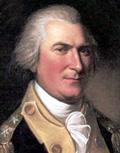" 9th President of the Continental Congress "
" Maryland "
( November 5, 1781 - November 3, 1782 )
|
|
Date & Place of Birth
April 3, 1715, Mulberry Grove, Charles County, Maryland
Passed Away
November 22, 1783, Oxon Hill, Prince George's County, Maryland
Place of Burial
Addison Graveyard, Oxon Hill, Maryland
Parents
currently unknown
Married
currently unknown
Children
currently unknown
He was the heir of one of the greatest family traditions in the colonies and became the patriarch of a long line of American patriots — his great grandfather died at Lutzen beside the great King Gustavus Aldophus of Sweden; his grandfather was one of the founders of New Sweden along the Delaware River in Delaware; one of his nephews was the military secretary to George Washington; another was a signer of the Declaration; still another was a signer of the Constitution; yet another was Governor of Maryland during the Revolution; and still another was a member of the first Congress; two sons were killed in action with the Continental Army; a grandson served as a member of Congress under the new Constitution; and another grandson was a Maryland Senator.
Thus, even if Hanson had not served as President of the Continental Congress himself, he would have greatly contributed to the life of the nation through his ancestry and progeny.
As a youngster he began a self-guided reading of classics and rather quickly became an acknowledged expert in the juridicalism of Anselm and the practical philosophy of Seneca — both of which were influential in the development of the political philosophy of the great leaders of the Reformation. It was based upon these legal and theological studies that the young planter — his farm, Mulberry Grove was just across the Potomac from Mount Vernon — began to espouse the cause of the patriots.
In 1775 he was elected to the Provincial Legislature of Maryland. Then in 1777, he became a member of Congress where he distinguished himself as a brilliant administrator. Thus, he was elected President of the Continental Congress in 1781. He served in that office from November 5, 1781 until November 3, 1782. He was the first President of the Continental Congress to serve a full term after the full ratification of the Articles of Confederation — and like so many of the Southern and New England Founders, he was strongly opposed to the Constitution when it was first discussed. He remained a confirmed anti-federalist until his untimely death.
" 15th President of the Continental Congress "
" Pennsylvania "
( February 2, 1787 - Janaury 21, 1788 )
|
|
Date & Place of Birth
March 23, 1734, Thurso, Caithness, Scotland
Passed Away
August 31, 1818, Hermitage, near Youngstown, Pennsylvania
Place of Burial
Old St. Clair Cemetery, Greensburg, Pennsylvania
Parents
currently unknown
Married
currently unknown
Children
currently unknown
Born and educated in Edinburgh, Scotland during the tumultuous days of the final Jacobite Rising and the Tartan Suppression, St. Clair was the only President of the Continental Congress born and bred on foreign soil.
Though most of his family and friends abandoned their devastated homeland in the years following the Battle of Culloden — after which nearly a third of the land was depopulated through emigration to America — he stayed behind to learn the ways of the hated Hanoverian English in the Royal Navy. His plan was to learn of the enemy's military might in order to fight another day. During the global conflict of the Seven Years War — generally known as the French and Indian War — he was stationed in the American theater.
Afterward, he decided to settle in Pennsylvania where many of his kin had established themselves. His civic-mindedness quickly became apparent he helped to organize both the New Jersey and the Pennsylvania militias, led the Continental Army's Canadian expedition, and was elected Congress. His long years of training in the enemy camp was finally paying off.
He was elected President of the Continental Congress in 1787 — and he served from February 2 of that year until January 21 of the next. Following his term of duty in the highest office in the land, he became the first Governor of the Northwest Territory and the founder of Cincinnati.
Though he briefly supported the idea of creating a constitutional monarchy under the Stuarts' Bonnie Prince Charlie, he was a strident Anti-Federalist — believing that the proposed federal constitution would eventually allow for the intrusion of government into virtually every sphere and aspect of life. He even predicted that under the vastly expanded centralized power of the state the taxing powers of bureaucrats and other unelected officials would eventually confiscate as much as a quarter of the income of the citizens — a notion that seemed laughable at the time but that has proven to be ominously modest in light of our current governmental leviathan.
St. Clair lived to see the hated English tyrants who destroyed his homeland defeated. But he despaired that his adopted home might actually create similar tyrannies and impose them upon themselves.
 Harrolds.Blogspot.com
Harrolds.Blogspot.com


No comments:
Post a Comment
Please, avoid posting advertisements. Content comments are welcomed, including anonymous. Posts with profanity will not be published.